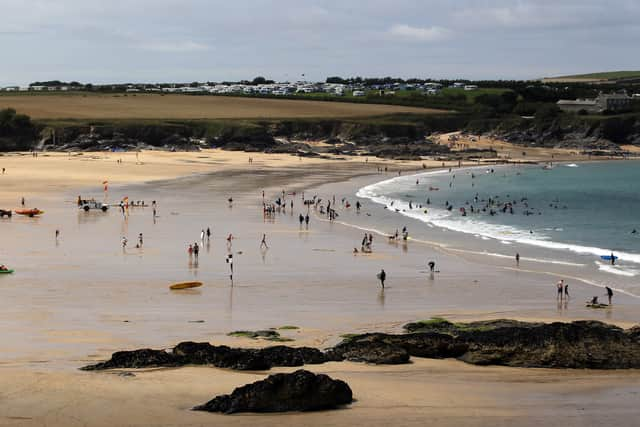Water bosses should face jail time on top of bonus bans, campaigners say SAVE BRITAIN'S RIVERS
No 10 is accused of 'smoke and mirrors' as it announces it will consult on banning bonuses for polluting water firms' bosses

By Lucie Heath
Environment Correspondent
February 12, 2024
Plans from the Government to ban bonuses for the bosses of water firms polluting Britain’s rivers do not go far enough and chief executives should face jail time instead, campaigners have said.
The Environment Secretary, Steve Barclay, announced plans on Sunday to consult on new measures that would give the regulator Ofwat the power to block bonuses for the chief executives and directors of water companies.
It comes amid rising anger over the dumping of sewage into Britain’s rivers, lakes and coastal areas.
Campaigners told i the new measures amounted to “smoke and mirrors” and were not enough to address the scale of the problem facing Britain’s freshwaters.
They said ministers should instead be threatening water company bosses with jail time for major pollution incidents.
“The Government’s proposal on bonuses goes nowhere near far enough. A robust regulatory regime should include criminal sanctions,” said Nick Measham, chief executive of the campaign group WildFish.
Under the current law, water company bosses could technically face criminal charges for dumping sewage beyond the conditions of their permit, but this rarely happens.
Criminal cases are lengthy and expensive, meaning the Environment Agency often relies on civil penalties, which do not come with jail time.

Sea swimmer's revolt: The army of people boycotting bills over sewage spills
The EA has previously said it would like to see prison sentences for water company executives responsible for serious pollution, in the same way bosses in other sectors can face jail time.
Labour recently told i it would put water bosses responsible for serious pollution “in the dock” if it wins the next general election but it stopped short of saying they should face jail sentences. The Liberal Democrats have said chief executives should go to jail if the “British legal system decides”.
As the law technically already allows water firm bosses to face criminal charges, it is likely that the EA would need to be better resourced to bring forward such cases.
“Waste company directors who run illegally operating companies are jailed and the Proceeds of Crime Act is used to seize profits from pollution, yet water company directors who do the same thing are merely threatened with having their bonuses reduced,” added Ash Smith, founder of the group Windrush Against Sewage Pollution.
“In 2021 the Environment Agency was talking about jailing water company bosses – they could certainly prosecute and it is remarkable that they have never done so as Crown Court judges have noticed and commented on their absence.”
Matt Staniek, founder of the Save Windermere campaign, questioned whether a “slap on the wrist” would “rectify the systemic criminality that has been demonstrated in the industry”.
i’s Save Britain’s Rivers Campaign
For the past year i has been highlighting the disgusting state of Britain’s rivers, lakes and beaches through our Save Britain’s Rivers campaign.
In collaboration with our sister title, New Scientist, we have shown how water companies are dumping waste into our most precious bodies of water, and how a lax regulatory system is allowing them to get away with it.
We’ve revealed how one water company drove 240 truckloads of untreated waste to an overflowing pumping station in a popular Devon seaside town, and took a deep dive into the issue of sewage tankers, which are blighting Britain’s most idyllic villages and national parks.
We’ve held the Environment Agency to account for its failures to penalise those who break the rules, revealing last year that the watchdog is failing to visit 90 per cent of toxic water spills in England.
Our reporters have travelled to the areas of the country most affected by this scandal to meet those who are taking a stand against water companies and their regulators.
Together with these passionate campaigners we will bring about the policy changes required to restore Britain’s rivers to their once pristine state.
Water companies are allowed to discharge sewage from their network during times of exceptional rainfall, but evidence has suggested this is happening more regularly and a number of firms have admitted to spilling sewage beyond the scope of their permit conditions.
“How quickly would we see these problems solved if water company bosses were treated in the same way that waste company bosses are? Waste company bosses go to jail when they break the law, water companies are given a slap on the wrist,” he said.
Campaigners also criticised the Government for the amount of time it is taking to introduce the ban on bonuses.
On Sunday, Mr Barclay said Ofwat would consult on the changes later this year with the aim to introduce the crackdown in for bonuses issued during the 2024/25 financial year.
While the criteria for a ban will be decided as part of the consultation process, the Government suggested this could follow a successful prosecution for the severest types of pollution incidents, or where a company has been found guilt of serious management failings.
Several water bosses waived their bonuses last year in response to public anger over the sewage scandal, but five chief executives did take home bumper packets, including Anglian Water chief executive Peter Simpson, who took home a bonus of more than £300,000.

“The staggering fact is that bonuses were being paid in the first place to water company bosses whose businesses were breaking the law. It is also disappointing to see that, as with so many other similar water policy announcements, this will be ‘subject to consultation’,” said Charles Watson, chair and founder of River Action.
The Liberal Democrat’s Environment spokesperson Tim Farron described the “Conservative attempt to ban bonuses” as a “farce”.
He said the criteria set out by the Government would “set the bar so high” that it is “unlikely any bonuses will be banned for these disgraced firms”.
“Clearly, if a water firm CEO is complicit and aware of illegal environment destruction, they should face punishment. If the British legal system decides a jail sentence is appropriate, then so be it,” he said.
Labour’s shadow Environment Secretary, Steve Reed, recently told i the party would put water bosses responsible for pollution “ in the dock”.
Announcing the consultation on Sunday, Mr Barclay said the Government will “shortly be setting out more detail on further steps to clean up our waters, including reducing the reliance on water company self-monitoring in order to hold them to account and drive the improvements we all need to see”.
Surfers Against Sewage map shows raw sewage has been pumped into the sea at 113 beaches across the UK
By Isabella Boneham
Published 12th Feb 2024,
Raw sewage has been pumped into the sea at over 100 beaches across the UK today (Monday 12 February), according to Surfers Against Sewage (SAS) interactive map. The charity updates the map everyday issuing pollution alerts at beaches that have seen their sewer networks overflow.
The warning on the site reads “storm sewage has been discharged from a sewer overflow in this location within the past 48 hours” adding “bathing not advised due to poor annual classification”. Today 113 UK beaches have been issued a sewage pollution alert, advising the public not to swim there. Some of the beaches are those that are very popular among holidaymakers include Weston-super-Mare’s main beach, Croyde Bay in Devon, Crantock Beach in Cornwall and Hunstanton Beach in Norfolk.
Among the locations are some which have been plagued by sewage alerts recently. For example, Langstone Harbour in Portsmouth, which is on the list, saw sewage discharged there for 181 hours across eight days last November. Harlyn Bay in Cornwall also has a sewage alert, despite a former teacher telling NationalWorld in December that he is "absolutely outraged" at the amount of sewage that "just keeps on pumping" onto the Cornish beach. William Howells said he has been “sick since the end of July” after a “quick surf” at Harlyn Bay and suffered “three days of awful gastroenteritis”.

The huge number of sewage pollution alerts today comes after a yellow weather warning for rain was issued by the Met Office over the weekend. The warning covered the East Midlands, East of England, North East England Yorkshire and Humber from Saturday (9 February) through to Sunday noon (10 February).
During periods of heavy rainfall sewer networks can become overwhelmed resulting in sewage being discharged from combined sewer overflows (CSOs) instead of being treated. Water companies are issued with permits that allow them to discharge sewage if their networks are overwhelmed by rainwater in what should be exceptional circumstances.
Firms have been heavily criticised for the amount of times they utilise the storm overflow system and investigations have even found that some companies discharge sewage on days when it is not raining. Following sewage alerts, a SAS spokesperson told NationalWorld that the “blatant disregard for public health and our blue spaces is appalling.” The spokesperson added: “Water companies spill sewage come rain or shine, all the while syphoning off tens of billions to shareholders and paying the fat cats at the top huge pay and bonuses.”
Water companies face fines for poor customer service
From today (12 February 2024) Ofwat has new powers to act against any water company that provides poor customer service in breach of a new licence condition, which could see the regulator impose fines of up to 10% of the company’s turnover.
Ofwat expects all water companies to be focused on delivering a high level of customer service – from resolving complaints to making sure customers are informed and supported during incidents where water supplies are disrupted.
There are examples of where water and wastewater companies and their staff are going above and beyond for their customers across England and Wales. However, there are still too many instances where customers feel let down, and that their water company does not have customers’ best interests at heart.
Recent figures published in Ofwat’s annual Water Company Performance Report, show that in 2022-23 there was a fall in customer satisfaction across most companies. This follows a decline in scores in 2021-22, and customer satisfaction is lower for all companies than it was in 2020-21.
Ofwat’s incidents research has also identified examples of poor customer service with companies failing in communication and support when things go wrong, leading to dissatisfaction and in some cases anxiety.
Customers deserve better, and Ofwat has now added to its regulatory tools to strengthen and enforce customer protection.
David Black, CEO, Ofwat said:
“From today we are putting water companies on notice to improve customer service and where we see failure, Ofwat can and will take action which could result in significant fines.
“Our new powers to issue fines for poor levels of service are part of a range of measures Ofwat has recently introduced including on environmental protection, company dividends and executive pay, to drive better performance and to hold water companies to account.
“We expect this new licence condition to deliver real improvements in customer service across the sector. It is in the companies’ interests to put customers at the heart of their business and provide levels of service that increase customer satisfaction.”
Environment Secretary Steve Barclay said:
“We expect water companies to ensure customers are properly supported when services are disrupted.
“Enforcement action for poor customer service is an important and necessary step to restoring trust in the water sector and has been made possible thanks to government giving Ofwat increased powers to modify the licences of companies in England under the Environment Act.
“We are driving forward more investment, stronger regulation and tougher enforcement through the Plan for Water and will continue working closely with regulators to improve outcomes for both customers and the environment.”
Mike Keil, Chief Executive of the Consumer Council for Water (CCW), said:
“Every water company should provide excellent customer service but too often through our research and the complaints we handle we see people being badly let down, particularly by poor communication. A complete change in culture is needed in some companies if we’re to improve people’s experiences and repair fractured trust and the new customer licence condition can help to focus minds.”
END
Notes to Editors
Ofwat’s customer-focused licence condition: Customer-focused licence condition – Ofwat
Water company licences: Licences and licensees – Ofwat
Ofwat Water Company Performance Report 2022-23: Water Company Performance Report 2022-23 – Ofwat
Ofwat’s incidents research: Customer experiences – Ofwat
CCW Household customer complaints report 2023: Household customer complaints report 2023 – CCW
No comments:
Post a Comment